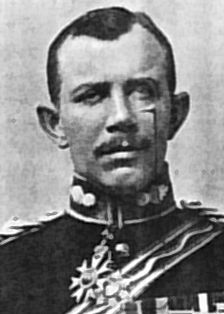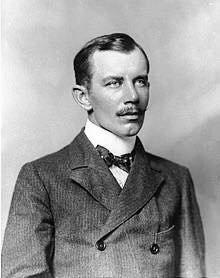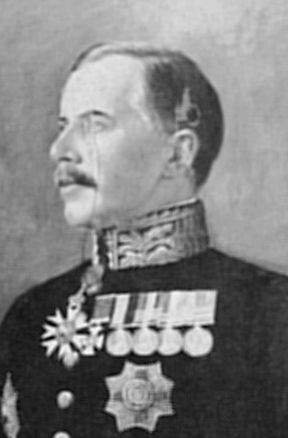Back to search results
Name: GIROUARD, Edouard Percy Cranwill KCMG, DSO (Col. RE), Sir



Birth Date: 26 Jan 1867 Montreal, Canada
Death Date: 26 Sep 1932 London
First Date: 1909
Profession: Governor of EAP from 1909-1912. He had served in 1896 as a Sapper with the Dongola Expedition, laying military railways for Lord Kitchener, and later was Director of Railways
Area: Nairobi
Married: In Pretoria 10 Sep 1903 Mary Gwendolen Solomon (div. 1914) b. 16 Aug 1882 Grahamstown, d. 16 May 1916 ?St Thomas, Devon
Children: Richard Desire (3 Sep 1905London-12 Nov 1989 Kensington, London)
Book Reference: Gillett, HBEA, Cuckoo, Permanent Way, Oscar, Golf, McCutcheon, Cranworth, Kenyatta, White Man, Debrett, DSO, Nicholls, Hughes, Mills, Red Book 1912
School: Roy. Mil. Coll., Kingston, Canada
General Information:
He served with GHQS African Field Force, 1899-1901, and thereafter was Commissioner of Railways, Transvaal and Orange River Colonies Unit 1904, and then High Commissioner of Northern Nigeria, 1907-08. He was born in Canada, (his father was a Justice of the Supreme Court of Canada), and on retirement was appointed Managing Director of Armstrongs. Robert Foran met him in Johannesburg when G. was Commissioner of the Central S.A. Railways.
Permanent Way - Only 42 years old, he was a French-Canadian who had made a great name as a builder and administrator of railways. Girouard had joined the Royal Engineers in 1888. Eight years later he was appointed a member of the Distinguished Service Order and a brevet-major for his services with the Dongola Expeditionary Force; and he won Lord Kitchener's approval for rushing a railway across the Sudan desert. From 1890 to 1895 he had been Railway Traffic Manager at the Royal Arsenal at Woolwich. In 1896 he was appointed Director of the Sudan Railways, and, two years later, President of the Egyptian Railway Board. From 1899-1902 he was Director of Railways in SA, and from 1902-04 Commissioner of Railways in the Transvaal and Orange River Colony. He was appointed KCMG in 1900, at the age of 33, and a brevet-colonel in 1904. For the next two years Sir Percy was A.Q.M.G. of the Western Command at Chester. At that time plans for a railway in Northern Nigeria were under discussion, so Girouard was sent there as High Commissioner in succession to Lord Lugard in 1907. ........ Sir Percy G. was a great admirer of Lugard , and he believed in the principles of 'indirect rule' which Lugard advocated for Colonial Africa. He was a sound administrator and a man of dynamic energy, with the gift of inspiring others with his own zeal and sense of urgency. ......... resigned over a land grant problem like Eliot. Two settlers were pledged land in Laikipia and the Secretary of State over ruled these grants. .......... Sir Percy, an able administrator, resigned and became Managing Director of the great industrial and armament firm of Armstrong-Vickers.
Oscar - in a letter home Oscar Watkins wrote 'I have no doubt he is very good for us. He is behaving like a fox terrier among Great Danes, snapping round at everybody. However, he can't dismiss us all. He has come out with the notion that none of us are competent to run a bun-shop. He'll get fever soon and calm down a bit.'
Golf - elected Captain at first annual general meeting of Nairobi Golf Club in 1910.
McCutcheon - On steamer 'Adolf Woermann' met Sir Percy Girouard - newly appointed Governor of BEA - a splendid type of man, only about 42 years old, but with a career that has been filled with brilliant achievements. Born in Canada and was knighted in 1900. Recently Governor of Northern Nigeria and before that served in SA and the Soudan. It was of him that Lord Kitchener said - "the Soudan Railway would never have been built without his services."
Cranworth - Sir Percy Girouard came with a high reputation, acquired both in peace and war. A French-Canadian by birth and a sapper by profession, he first came into prominence as Lord Kitchener's right hand man in railway construction in S. Africa ......... Kenya, or rather BEA as it was then was lucky indeed in the appointment. From the commencement of our Administration to the present day she has had among her Governors men of the highest distinction, but in my judgement Sir Percy reigns supreme amongst those I have known ....... a man of vision and of boundless energy ......... he had not the slightest fear of giving offence to the Colonial Office and of the dreadful consequences that might follow his delinquency ....... railway line to Fort Hall. ....... Lady Girouard was very much younger than Sir Percy, and perhaps was not always quite as tactful as she might have been ....... The Girouards were very fortunate in the staff they brought out from England ........ Capts. John Murray and Pat O'Brien, who alternated the roles of secretary and ADC .... Sir Percy's regime was marked by the greatest progress of any period of Kenya's history ...... Two troublesome events - the Masai Move and the deportation of Galbraith Cole. ....... Sir Percy was not only a naturally friendly man, but he was a settler's man.'
Kenyatta - Governor 1909-12, began with high hopes and ended with having to resign through what appeared to be a deliberate attempt to mislead his superiors at Whitehall ..... Masai ..... Girouard, it transpired, promised their (Masai) land to prospective settlers, and then denied having done so. The scandal was broken to interested parties in London by a government medical officer, Norman Leys, who went on to become one of the strongest critics of Britain's settler policy in Kenya.
White Man - was a French Canadian, born in Montreal with a passion for building railways. As a sapper subaltern of 29 he built a line for Kitchener in record time across the Sudan deserts. Before he was 33 he had the reorganisation of the Egyptian Railway system to his credit. He became one of 'Milner's young men' and was given the task of reconstructing the SA lines after the war. Then there was talk of a railway in Nigeria. Girouard was sent for and appointed Governor. As soon as he arrived he started to build a line from Baro to Kano. He was in Nigeria when the Governorship of EA fell vacant and he was moved to fill it. He was a good administrator and an active, energetic man who stood little on official ceremony and had the reputation of galvanising his subordinates into frenzies of activity. .......... a small, dapper man with an eyeglass and a great belief in keeping fit. ..... Delamere and Girouard liked each other immediately. ......... Girouard and his Treasurer Mr Bowring reorganised the country's finances and did away with the grant-in-aid within 3 years. ........... early 1912 - Girouard resigned in order to accept a highly paid business position, to become managing director of Armstrong-Vickers. It was generally believed that his decision was influenced by a difference of opinion with the Secretary of State, Mr Harcourt, over the question of the Masai move (2nd move from Laikipia to unite the tribe again) Move completed in 1912.
Debrett - entered R.E. 1888, and became Capt. and Brevet Major 1899, Brevet Lieut.-Col. 1904, and Major and Brevet Col. 1908; retired 1912; served in Dongola Expedition 1896, as Director of Railways (despatches, DSO) with Nile Expedition 1897-8 (Brevet Major), and in S. Africa 1899-1902, as Director of Railways, with rank of Lieut.-Col. (despatches, KCMG); was Railway Traffic Manager at Roy. Arsenal, Woolwich 1890-95, Director of Soudan Railways 1896-8, Pres. of Egyptian Railway Board 1898-9, and Railway Commr. Transvaal and Pres. of Board of Control 1902-4, Staff Officer RE, E. Command 1905, AQMG, W. Command 1906, High Commr. and Com.-in-Chief of N. Nigerian Protectorate 1907, Gov. and Com.-in-Ch. there 1908, and Gov. and Com.-in-Ch. British E. Africa Protectorate 1909-12; subsequently a Director of Sir W.G. Armstrong, Whitworth and Co.; has 2nd class Medjidie; is a Fellow of Roy. Colonial Institute.
DSO - was created a Companion of the Distinguished Service Order, London Gazette 17/11/1896 - In recognition of services during the recent operations in the Sudan ……. {lots more detailing his military career}
Nicholls - a French Canadian born in Montreal and formerly the drector of Railways in the Sudan, Egypt and South Africa. Girouard had married into Transvaal society but his wife thoroughly disliked the EAP and the partnership crumbled shortly after he completed his tour in 1912. A short, dapper, handsome man with boyish energy and enthusiasm, he talked with a clipped accent and sported a monocle. He got on better with the settlers than with his own officials, of whom he was very critical in his home despatches. ………… {more}
Sir Alfred Pease - 'Girouard was not much use' (notation in his copy of 'White Man's Country')
Hughes - Girouard soon followed Cole out of the country, initially on home leave. By July, he had resigned and gone for good. It wasn't simply a case of having deceived the CO about the Maasai move; he had also lied to Harcourt about promising setlers farms on Laikipia. The row over this raged long after Girouard had left. One settler - Russell Bowker - even demanded that the Government should pay him rent, as Girouard had verbally pledged, for accommodating the flocks of setlers displaced from the Southern Uaso Nyiro to make way for the 'northern' Maasai. Girouard was also in trouble with the CO for a host of other reasons. He had begun to build the Thika tramway, effectively a private railway line for a handful of estate-owners who needed to get their produce to market, without official blessing and having lied about what it would cost. He had enraged Harcourt by telling the press that Cole was only being deported on the orders of the CO. He was far too close to the settler community for the CO's liking, and it only knew half the story. But there were also personal reasons to resign. He had been offered a lucrative new job, a directorship with the shipbuilding and armaments firm of Armstraong, Whitworth & Co. near Newcastle upon Tyne. His wife was sick and had been advised not to return to East Africa. Privately, his marriage was on the rocks and would soon be over; Gwen had petitioned for divorce on the grounds of desertion and adultery. As Governor the stigma of this was unthinkable. He was tired of the problems facing him, tortured by insomnia, and certainly prepared to go.
Red Book 1912 - Sir E.P.C. Girouard - Nairobi
Facebook - Historia Ya Wakenya - Now Girouard's wife was a white South African from Transvaal. She thoroughly disliked East Africa and unable to keep up with her husband in Kenya, subsequently divorced him circa 1913.
But even in the run up to the matrimonial split up, Girouard came off as cold and unhappy to his officials, of whom he was very critical in his London dispatches.
One of his officials was ‘hopeless and supine’, another ‘self-satisfied and pig-headed’, and a third ‘mistrusted and unpopular’.
Girouard also had a rebellious streak and against colonial government position, unilaterally pushed through the construction of the railway to Thika.
Divorce petition (Ancestry) on grounds of his adultery and desertion
Back to search results



